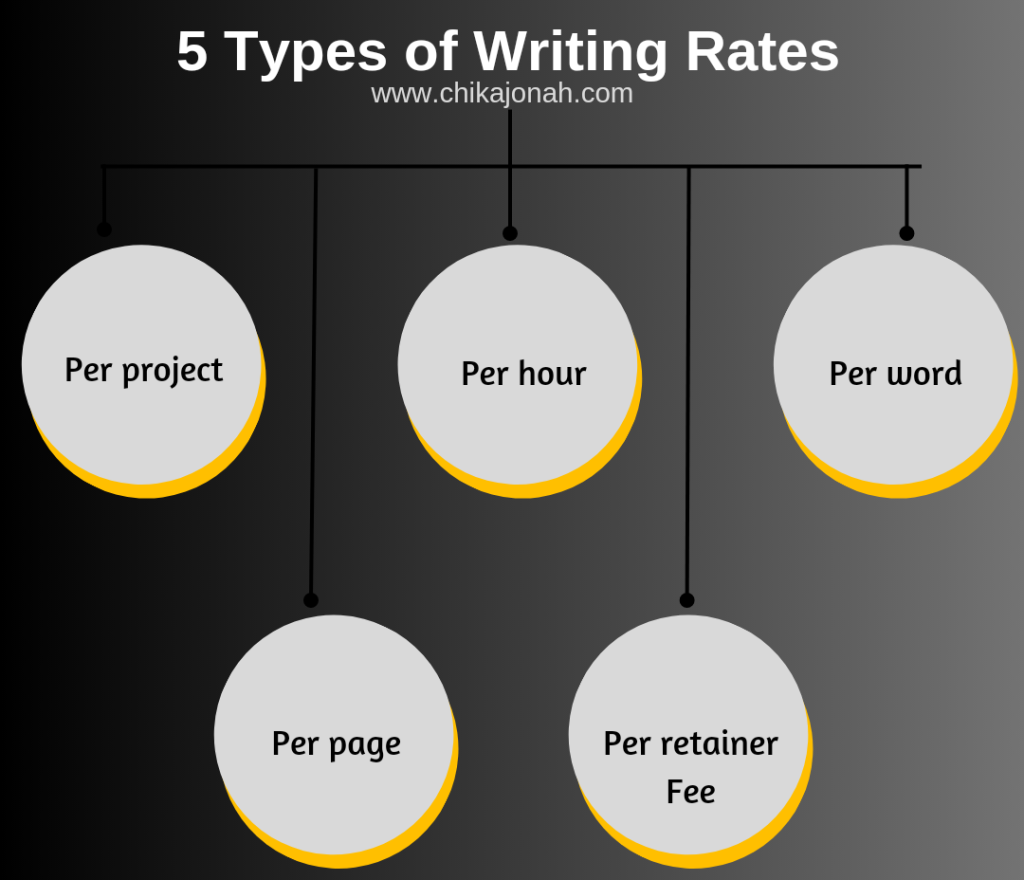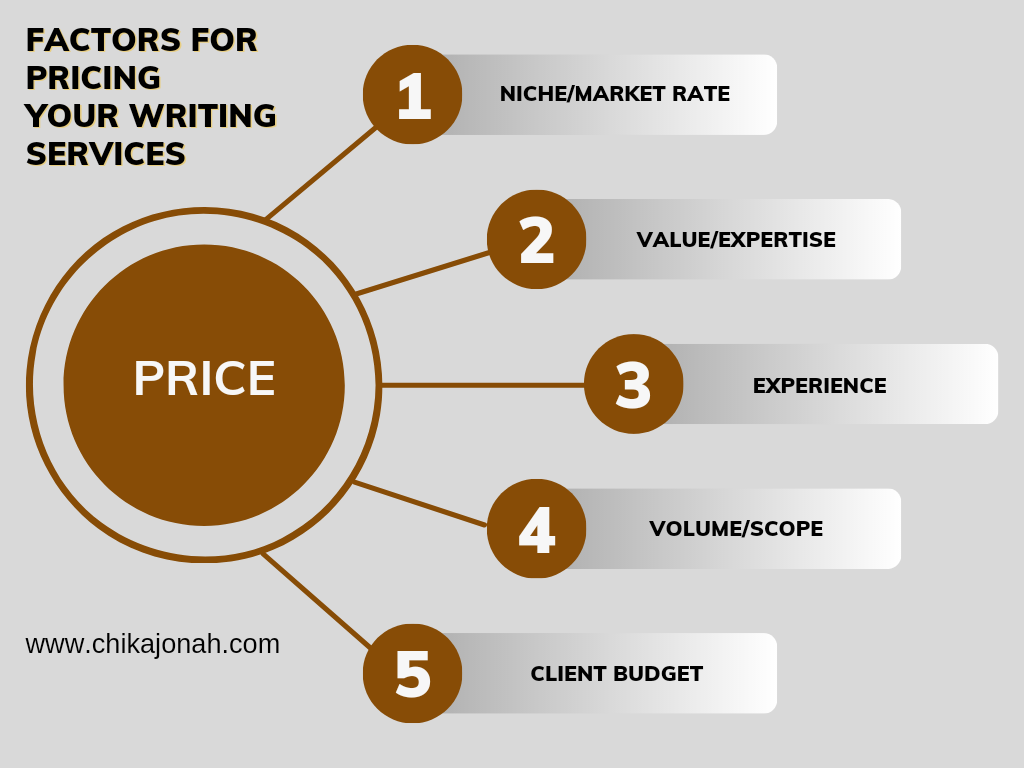Pricing your writing services has got to be the most tricky part for writers on their path to monetize their writing skills.
Writers find it difficult to set fair and competitive rates for their work. Some writers work like an elephant and charge peanuts, others charge unrealistic rates for their work. So what’s the best way of pricing your writing services? How can a writer price their writing services? What are the undisputed formulas for pricing your writing services right?
It takes more than your worth to price right. It takes more than your experience to charge right. It also takes more than the value you bring to charge fairly.
Writing professionally is a lucrative career that allows you to write from anywhere and get paid fairly. But for that, you must not only build your writing skills but also be skilled at pricing your work well.
This is why this content is going to crack the code to pricing your writing services the right way and help you say goodbye to unfair deals. But before you charge, it’s important you know the different types of writing rates to assist you in pricing your writing services.

5 Types of Writing Rates.
Per project
If you’re an expert in a specific type of assignment, project-based pricing is often the most lucrative option. It allows you to complete tasks efficiently while earning a handsome fee. Pricing your writing services per project helps you account for every resource you need to complete the project, thereby helping you figure out a suitable flat rate.
Per hour
Hourly rates are suitable when a project demands a significant amount of time and effort. However, many clients are cautious about hourly billing, so you’ll need to demonstrate transparency and accountability in your time tracking. Personally, this is my least favorite type of rate so I tend to avoid hourly-paid projects because charging by the hour might put you at a disadvantage, especially if the project can be completed in just a few hours.
Per word
Charging by the word is a fair and transparent way to price your writing services. Both clients and writers benefit as you’re compensated based on the actual content produced. However, be vigilant about how clients count words—whether it’s based on the final draft or the published version. Whenever possible, request that the client use a higher word count to ensure fairness.
Per page
When pricing your writing services using page-based pricing, it’s crucial to define what constitutes a “page” up front. Specify the page size, font type, font size, character spacing, and line spacing (single, 1.5, or double). Once you and the client agree on these parameters, calculate the approximate word count per page. Then, multiply it by your current price per word to determine the page rate.
Per retainer fee
Retainer fees are an excellent option for long-term clients. I use this for my returning clients a lot. However, it’s essential to establish a clear understanding of the monthly workload in advance when pricing your writing services with this method. For instance, if you charge $400 per month for four blog posts, clarify the word count per post. Any additional words or extra work should be outlined in advance to prevent misunderstandings and disputes.


5 Factors Needed In Pricing Your Writing Services.
A lot of writers struggle with how to price their work. Either they charge less or they can’t confidently state their price. Pricing your writing services and setting the best rates for your work is a combination of these five (5) factors. They are:
1. Niche
2. Expertise
3. Experience
4. Scope/Volume
5. Client profile
1. Niche/Market Rate
This is the industry standard for every niche. The price for a social media copy is different from the price for a blog SEO copy. The price for a tech blog content is different from the price for a business writing. The price for writing a web page copy is different from the price for writing a digital campaign copy. Search on Google to see the industry price for a particular niche and take note of it.
2. Value/Expertise
There is no shame in saying you know nothing much about something. Charge based on what you know. A writer who knows how to not only write SEO content but also the technical SEO for your site will charge more than you who only know how to write an SEO blog post. A writer who not only knows how to write but knows how to use storytelling to drive a narrative will charge higher than someone who simply knows how to write well. So charge based on the level of your expertise.
3. Experience
Have you ever wondered why brands hire based on experience? Because whether you choose to believe it or not, EXPERIENCE IS GOLD. This is why I advise writers to gain experience, even if it’s an unpaid job to build their portfolio. It doesn’t matter how well you write, an experienced writer is a seasoned writer. He/she has worked through different situations, styles, and conditions to produce results through their work. So it’s right that a person with more experience will charge more than you who have little to no experience. Set your price based on your experience
4. Volume/Scope
The bigger the work the higher the price. A person writing a 400-page book should charge higher than a person writing a 100-page book. A 1000-word SEO blog post is less in price than a 2000-word SEO blog post. Additionally, a person writing a 7000-word research paper in ten days will charge more than someone doing the same work in one month because the time frame and scope are bigger. Charge based on the volume and scope of the work.
5. Client Budget/Profile
Check if the client can pay you. Check their company. Check their location. Answer questions like; Is it a startup? Is it an individual? Is it a Nigerian or International company? It’s important to understand your client’s budget and their expectations. Ensure your pricing aligns with their financial constraints.
Now that you know the factors that aid in pricing your writing services right, I’m sure your next question is how these factors play in fixing the best rates for your writing services. Well, sit tight, you are about to be blown away.

The Formula to Pricing Your Writing Services.
Now you know that you need the Market rate, Expertise, Experience, Scope/Volume, and Client budget to price your writing. But note that these points do not work individually.
You cannot price your work just because the industry says that this is the amount to be charged per hour in that niche. You also cannot price your work ridiculously high just because the client or company has a huge budget and can afford to pay anything.
To price confidently, you’ve got to combine industry price, your expertise, your experience, the scope & volume of the work, and the client profile to set a fair price. Then add your expenses and tax.
Calculate Your Costs:
1. Factor in your operational costs, including software subscriptions, research tools, internet connection, office space, and any other tools or resources you need for your writing.
2. Also account for taxes and other financial obligations.
In pricing your writing services, balancing these factors together and being confident in your skills and in communicating the value you bring to your clients is essential. Over time, as you gain experience and build a reputation, you can adjust your rates accordingly.
Also, don’t hesitate to ask your senior colleagues in the industry to assist you when you’re conflicted on how to charge for a particular work. Their experience and guidance would be an added advantage to you. You can contact me anytime here

Ready to Price
While it’s important to price right, it’s also important to emphasize the value you bring to the client. How will your writing benefit their business or project? Use this as a selling point when discussing your rates.
Before you discuss rates and pricing, discuss value first. It shows that you care about the brand and you take pride in the work you do. This would also make the client believe in your capabilities and pay you accordingly.
Remember that pricing your writing services can vary widely depending on the industry, location, and individual circumstances. It’s crucial to be transparent with clients about your rates and the services they include. Additionally, as your skills and portfolio grow, you can consider adjusting your rates to reflect your increasing value in the market. Even if you’ve failed once at charging your worth, don’t stress, follow this formula and set the best price for your services. I hope this content has opened your eyes to pricing your writing services the best way.
Was this useful? Let me know in the comment below.



